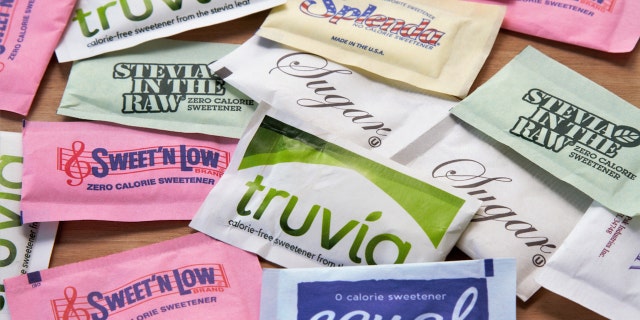The World Health Organization (WHO) isn’t too sweet on the use of sugar substitutes for weight loss or disease prevention.
In new guidance, the WHO specifically recommended against the use of non-sugar sweeteners (NSS) for the purposes of controlling body weight or lowering the risk of non-communicable diseases.
“Replacing free sugars with NSS does not help with weight control in the long term,” said Francesco Branca, WHO’s director for nutrition and food safety in Geneva, Switzerland, in a press release on May 15 announcing the new report.
POPULAR ARTIFICIAL SWEETENER, ERYTHRITOL, COULD RAISE RISK OF HEART ATTACK AND STROKE: STUDY
The WHO’s recommendations are based on a “systematic review” of 283 unique studies that measured the health effects of sugar substitutes in adults, children and pregnant women.
In addition to determining that using NSS is not effective in reducing body fat, the review found that long-term consumption of sugar substitutes could potentially cause a higher risk of heart disease, type 2 diabetes and mortality in adults, the WHO stated.
“Replacing free sugars with NSS does not help with weight control in the long term.”

Shown is a group of both artificial and natural sweeteners, including Splenda, Sweet ‘n Low, Equal, Truvia, Stevia in the Raw and plain sugar. (iStock)
Popular types of NSS include aspartame, acesulfame K, advantame, neotame, cyclamates, saccharin, sucralose, stevia and stevia derivatives.
The new guidance does not apply to low-calorie sugars or sugar alcohols (polyols).
Lifestyle factors could come into play, expert says
After reviewing the WHO’s findings, registered dietitian Erin Palinski-Wade, a nutrition consultant based in New York City, advised caution about drawing individual recommendations and conclusions from studies that “show association and not causation.”

The WHO’s new guidance does not apply to people with pre-existing diabetes. (iStock)
It is also possible that those who are genetically at a greater risk for these conditions had parents or caregivers who also incorporated NSS in the hopes of losing weight or managing blood sugar, Palinski-Wade pointed out.
“Without knowing additional lifestyle factors that can impact body weight, body composition and disease risk, it is hard to say what benefits [that] NSS may or may not offer,” she concluded.
‘Moderation and variety are key’
In her own nutrition practice, Palinski-Wade customizes NSS intake recommendations to each individual’s health goals and needs.
For those who do choose to use NSS, Palinski-Wade recommends incorporating a mix of varieties, such as monk fruit extract, stevia and others, to prevent consuming an excessive intake of any one specific sweetener.
“NSS can offer benefits such as reducing impact on blood sugar levels and reducing calorie intake of certain meals, but in order to improve body composition and reduce disease risk, a multitude of health behaviors need to be incorporated consistently — from increasing fiber to including daily physical activity, in combination with reducing added sugars in the diet,” she said.
“This is supported by an abundance of scientific evidence, backed by the world’s most highly regarded health and regulatory agencies, which validate the role of these ingredients,” said Robert Rankin, president of the Calorie Control Council, in a statement to Fox News Digital.
“Along with exercise and a healthy diet, low- and no-calorie sweeteners are a critical tool that can help consumers manage body weight and reduce the risk of non-communicable diseases.”
Recommendation did not include those with diabetes
The WHO’s new guidance does not apply to people with pre-existing diabetes, the press release stated.
“Their doing so dismisses the value and usefulness of non-sugar sweeteners for persons living with diabetes and pre-diabetes, which accounts for far in excess of 10% of the global population,” he added.

